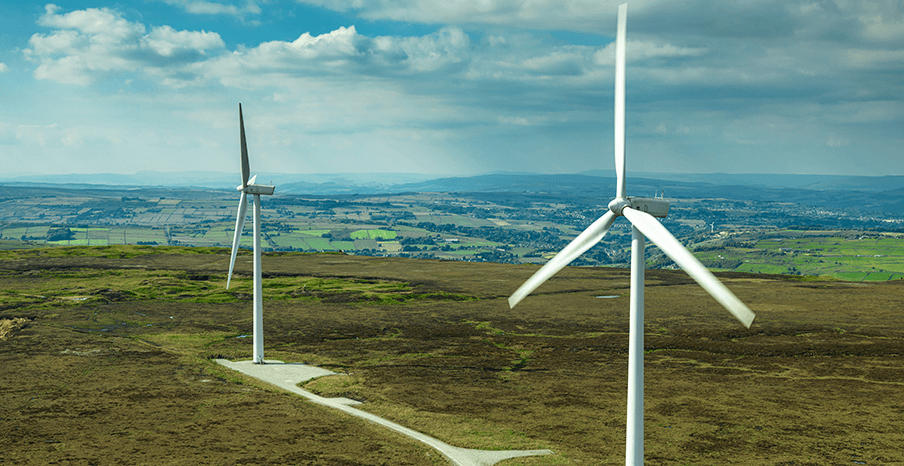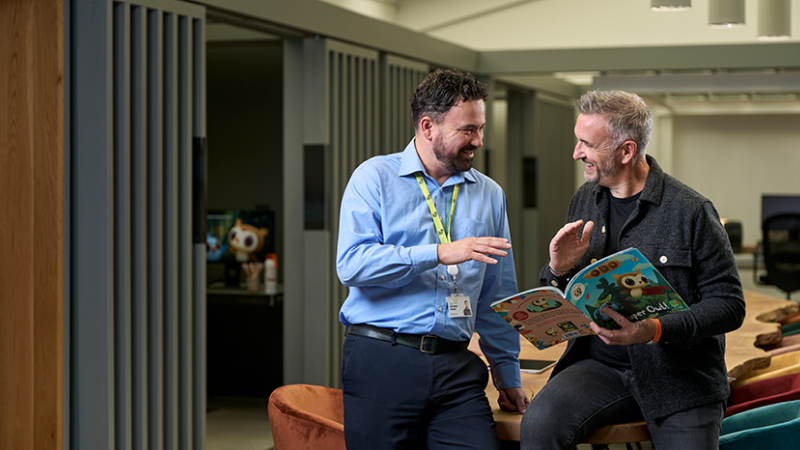Net Zero: Key growth areas for Northern Ireland’s green economy

Net Zero Week is a national awareness campaign that brings together academics, scientists, policy makers and trade associations to discuss how we can work together to reach net zero by 2050. It offers a timely opportunity to examine where Northern Ireland can not only contribute towards a global shift to net zero, but also lead elements of it.
In this article, our Head of Green Economy, Eugene Heaney, explores the key green economy growth areas that Invest NI is targeting to empower Northern Ireland businesses to exploit this sector.
The Climate Change Act (NI) 2022 sets a target of 100% reduction in greenhouse gas emissions by 2050, with an interim target of at least 48% emission reductions by 2030. As a result, Northern Ireland stands at a pivotal point in its green economy journey.
As the global economy transitions toward net zero, sustainability is no longer a distant pursuit but an essential driver of future productivity, competitiveness, and resilience. It is also becoming a requirement to do business.
Our regional advantages, such as advanced manufacturing capability, strong research and innovation infrastructure, dual market access to GB and the EU, and a resilient entrepreneurial base, provide the ingredients for green economic leadership. But translating ambition into growth requires strategic coordination across key sectors.
The following six priority areas represent opportunities for scaling innovation, skills, and building inclusive prosperity.
Building a resilient renewable infrastructure
While over 40% of Northern Ireland’s electricity already comes from renewables, challenges remain around curtailment and infrastructure capacity. The £2.23 billion Northern Ireland Electricity investment plan offers an opportunity to upgrade the grid and unlock further investment in renewables, battery storage, and smart distribution micro-grid systems.
By enhancing system flexibility and interconnection, Northern Ireland can accelerate the deployment of offshore wind, solar, and green hydrogen at scale, thereby improving energy independence, reducing costs and reaching our target of 80% renewables by 2030.
This opportunity will allow developers, grid technology innovators, and long duration storage suppliers to coordinate efforts and position themselves for upcoming infrastructure investment. This domestic capability can then provide export opportunities across Europe and the Middle East for Northern Ireland’s renewable expertise and manufactured components.
Retrofitting and designing the built environment
Buildings remain among the highest contributors to carbon emissions in the UK. The pathway to decarbonising the built environment is through energy efficiency, smart controls, and electrified heating via technologies such as heat pumps.
The UK and Irish governments have established ambitious targets for heat pump installation, creating sustained demand for manufacturers, system integrators, and retrofit professionals. Companies such as Glen Dimplex and Copeland are already innovating in these areas.
Given the targets for heat pump installations, providers in the construction and technology industries could expand their offerings to include retrofit and opportunities with smart buildings.
Partnerships between housing authorities, utilities, and the supply chain will be essential to encourage retrofitting and smart buildings.
Green transport and infrastructure
Transport represents 21% of Northern Ireland’s greenhouse gas emissions and a significant opportunity for transformation. Zero-emission vehicle development (e.g. hydrogen buses), maritime electrification, and Sustainable Aviation Fuel (SAF) are among the areas where Northern Ireland businesses are actively innovating.
With companies like Artemis and Catagen developing globally competitive solutions, there is an opportunity to consolidate supply chain capacity and position the region as a demonstrator hub for green mobility technologies.
By engaging fleet operators, local authorities, and transport infrastructure providers with solution providers and original equipment manufacturers (OEMs), we could develop pilot deployments and build on Translink’s leading low carbon fleet initiatives. A supportive ecosystem of charging infrastructure, incentives, and workforce development will only accelerate this expansion.
Hydrogen production and storage
With over 16,000 companies identified as potential contributors to the hydrogen value chain, Northern Ireland is well-positioned to shape the UK’s emerging hydrogen economy. The region ranks among the top four in hydrogen-specific manufacturing per capita, thanks to established firms such as Wrightbus and Catagen that are producing buses, fuel compression systems, and storage infrastructure.
Hydrogen offers significant decarbonisation potential across energy storage, transport, and industrial processes. Moreover, Northern Ireland’s wind and renewable assets strengthen its proposition as a location for clean hydrogen production.
By leveraging our innovative SMEs across engineering, logistics, materials, and services sectors, we could explore value chain entry points in hydrogen infrastructure projects. Coordinated investment in skills, research and development, and shared facilities can accelerate Northern Ireland’s positioning as a hydrogen innovation hub.
Carbon services
The global carbon services sector including emissions accounting, voluntary carbon markets, and digital verification—is projected to exceed $1.6 trillion by 2028. Northern Ireland’s strength in fintech, data services, and compliance advisory offers a compelling foundation for leadership in this space.
Embedding digital carbon solutions within sectors such as manufacturing and agriculture will be essential as regulations tighten, and supply chains increasingly demand verifiable low-carbon credentials.
NI’s world-leading technology firms should invest in carbon-related product development, while professional services companies should expand advisory capacity on carbon measurement, risk, and strategy. Clustering efforts around digital decarbonisation can position Northern Ireland at the forefront of this emerging market.
Sustainable water
Water management is increasingly recognised as integral to climate adaptation and industrial decarbonisation. Northern Ireland’s water tech ecosystem—supported by NI Water and a diverse engineering base—can lead in areas such as decentralised wastewater treatment, process optimisation, and digital leak detection. Global demand for climate-resilient infrastructure and circular water systems is expected to rise sharply over the next decade.
Water-intensive sectors should prioritise resource efficiency, while suppliers should pursue new product development and export partnerships. Public-private innovation programmes can help bring high-potential solutions to market.
Seizing the opportunity: A collaborative future
Northern Ireland has the assets, talent, and sectoral depth to lead in the global green economy, but advancements must be intentionally focussed. Coordination is required across government, business, and academia, as well as commitment to inclusive growth, regional balance, and long-term sustainability.
The strategic call to businesses:
- Access your full capabilities
- Align with the opportunities
- Connect with partners
- And take the first step toward low-carbon transformation
Invest NI will support you on that journey through funding, expert insight, and access to innovation networks. With clarity of purpose and shared ambition, Northern Ireland can turn environmental imperatives into economic opportunity.




Comments